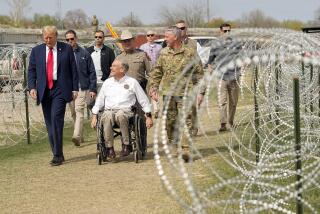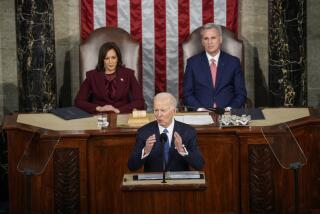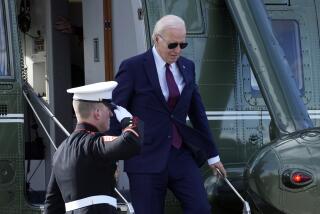Immigration activists push reform despite possible White House delay
Advocates pressing President Obama for an immediate immigration overhaul vowed Friday to continue to push for action, despite signs that the White House may postpone an expected change in deportation policy until after the November election.
“For us, the urgency is now,” said Cristina Jimenez, a co-founder of United We Dream, an organization of young immigrants who have staged some of the most high-profile protests and public confrontations with lawmakers on the issue. “We need the president to act to stop the deportation of our families. … We are going to hold him accountable.”
The president, fed up with congressional gridlock, has said he’ll use his executive power to make changes. But as the White House wrestles with the political and legal dilemmas involved in making significant alterations without congressional approval, Obama signaled this week he may defer his self-imposed end-of-summer deadline.
“Expectations are sky high,” said Frank Sharry, executive director of the immigration advocacy group America’s Voice, adding that if there is yet another delay to immigration reform, “the disappointment and anger is likely to be profound.”
Others warned any delays in announcing the policy might only hurt immigrants and prevent families from staying together. Deportations of immigrants in the U.S. illegally have averaged about 1,000 a day.
“The one concern of course is the number of families that will be separated from now until November,” said Kevin Appleby, director of migration policy and public affairs at the U.S. Conference of Catholic Bishops, which has not taken a position on whether the president should take executive action or work through Congress. “We would like to see families protected as soon as we can, however, we’d like to see them protected in a permanent way.”
One proposal under discussion would delay a decision on the more sweeping and controversial changes under consideration until after the November midterm election, according to a White House official familiar with the discussions.
Under that plan, the president would first announce measures aimed at tightening enforcement of current law, then put off until the end of the year a decision on a more sweeping program that could temporarily shield millions of immigrants from deportation.
The two-step plan would bow to the concerns of Democratic lawmakers running in Republican-leaning states who have expressed opposition to Obama’s plans to act unilaterally on the hot-button issue. Some Democratic senators have said he should wait for Congress to pass legislation.
And some Democratic strategists fret that the move would spark opposition among Republicans and energize the GOP base just weeks before the midterm election. The GOP is expected to maintain its House majority and needs a net gain of six seats to take control of the Senate.
Aides say the president has not made a decision on precise actions or timing. The official familiar with the talks, who would not be identified discussing internal deliberations, said the two-step proposal was one of several on the table.
Obama declared in June that he was fed up with lawmakers’ deadlock on immigration legislation and ordered Homeland Secretary Jeh Johnson to recommend a series of changes that did not require lawmakers’ approval.
At the time, the president said he expected the recommendations “before the end of summer” and intended “to adopt those recommendations without further delay.”
He has not yet received Johnson’s review.
At a White House news conference on Thursday, the president hinted that he may need more time than expected. Obama reiterated his plans to take some action, but did not repeat his deadline.
Instead, Obama noted that a recent surge of unaccompanied minors turning themselves in at the border appears to have subsided. The crisis consumed headlines for much of the summer, adding to Democrats’ worry that public support for easing the path to citizenship for those in this country illegally could slip.
Obama said Thursday that the crisis “changed the perception of the American people about what’s happening at the borders,” and argued that it demonstrated the need for changes. The situation also demanded his administration’s attention and resources, he said.
“Some of these things do affect timelines and we’re just going to be working through as systematically as possible in order to get this done,” Obama said at the news conference. “But have no doubt: In the absence of congressional action, I’m going to do what I can to make sure the system works better.”
White House officials say the president wants to enact broad changes, including a program modeled on one he established in 2012 for so-called Dreamers -- those illegally brought to the U.S. as children who have met other qualifications, such as a high school diploma or military service.
The new program could protect some groups of immigrants -- such as those who have deep roots in the U.S. or who have children living in the U.S. legally, for example -- from deportation.
Delaying that action until after November could give lawmakers more time to find consensus on immigration. Although few on the Hill think that is likely, Obama said he had not closed the door.
“Hope springs eternal,” he said Thursday.
Complicating Obama’s deliberations is the budget fight awaiting lawmakers when they return from their August recess early next month.
Congress must pass legislation to fund the government in the upcoming fiscal year by Sept. 30, when the current law expires. Key conservatives have warned that Republicans may try to stop the president’s actions by attaching prohibitions to the spending bill.
Such a move could resemble last fall’s 16-day government shutdown, when Republicans tried unsuccessfully to undo Obama’s landmark healthcare law.
Dan Holler, the spokesman for Heritage Action, the conservative organization influential with House Republicans, said that an extensive White House use of executive action on immigration would likely be met with an equally robust effort led by conservatives and Republicans in Congress to stop what they see as presidential overreach.
“The president is going out and taking steps that most Republicans and most conservatives think far exceed his constitutional limits,” Holler said.
Some Democrats have welcomed the shutdown scenario as an opportunity to portray the Republicans in Congress as extremists, particularly on immigration -- an issue especially important to Latino voters. But others have suggested that such a fight could damage both parties as voters have grown weary of crisis politics in Washington.
More to Read
Start your day right
Sign up for Essential California for news, features and recommendations from the L.A. Times and beyond in your inbox six days a week.
You may occasionally receive promotional content from the Los Angeles Times.









